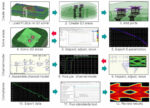High-fidelity models incorporating real-world, cross-domain effects are essential for accurate RF system simulation. The surging popularity of gallium nitride (GaN) technology in 5G base stations, satellite communication, defense systems, and other applications raises the bar for transistor modeling. Keysight dives… Read More
Electronic Design Automation
Anirudh Keynote at CadenceLIVE 2024. Big Advances, Big Goals
The great things about CEO keynotes, at least from larger companies, is that you not only learn about recent advances but you also get a sense of the underlying algorithm for growth. Particularly reinforced when followed by discussions with high profile partner CEOs on their directions and areas of common interest. I saw this recently… Read More
Will my High-Speed Serial Link Work?
PCB designers can perform pre-route simulations, follow layout and routing rules, hope for the best from their prototype fab, and yet design errors cause respins which delays the project schedule. Just because post-route analysis is time consuming doesn’t mean that it should be avoided. Serial links are found in many PCB designs,… Read More
Enabling Imagination: Siemens’ Integrated Approach to System Design
In today’s rapidly advancing technological landscape, semiconductors are at the heart of innovation across diverse industries such as automotive, healthcare, telecommunications, and consumer electronics. As a leader in technology and engineering, Siemens plays a pivotal role in empowering the next generation … Read More
Design Stage Verification Gives a Boost for IP Designers
The concept of shift left is getting to be quite well-known. The strategy involves integrating various checks typically performed later in the design process into earlier stages. The main benefit is to catch and correct defects or errors at an earlier stage when it’s easier and faster to address. For complex SoC design, … Read More
Fault Sim on Multi-Core Arm Platform in China. Innovation in Verification
How much can running on a multi-core (Arm) CPU speed up fault simulation? Paul Cunningham (GM, Verification at Cadence), Raúl Camposano (Silicon Catalyst, entrepreneur, former Synopsys CTO and now Silvaco CTO) and I continue our series on research ideas. As always, feedback welcome.
The Innovation
Lifecycle Management, FuSa, Reliability and More for Automotive Electronics
Synopsys recently hosted an information rich-webinar, modestly titled “Improving Quality, FuSa, Reliability, and Security in Automotive Semiconductors”. I think they undersold the event; this was really about managing all of those things through the lifecycle of a car, in line with auto OEMs strategies for the future of the… Read More
Podcast EP219: How Synopsys Addresses Debug and Coverage Closure Challenges with Robert Ruiz
Dan is joined by Robert Ruiz, product management director responsible for strategy and business growth of several verification products at Synopsys. Robert has held various marketing and technical positions for leading functional verification and test automation products at various companies including Synopsys, Novas… Read More
Semi Market Decreased by 8% in 2023… When Design IP Sales Grew by 6%!
Design IP revenues had achieved $7.04B in 2023, with disparity between license, growing by 14% and royalty decreasing by 6%, and main categories. Processor (CPU, DSP, GPU & ISP) slightly growing by 3.4% when Physical (SRAM Memory Compiler, Flash Memory Compiler, Library and I/O, AMS, Wireless Interface) slightly decreasing… Read More
ECO Demo Update from Easy-Logic
I first met Jimmy Chen from Easy-Logic at #60DAC and wrote about their Engineering Change Order (ECO) tool in August 2023. Recently we had a Zoom call so that I could see a live demo of their EDA tool in action. Allen Guo, the AE Manager for Easy-Logic gave me an overview presentation of the company and some history to provide a bit of context.… Read More











Advancing Automotive Memory: Development of an 8nm 128Mb Embedded STT-MRAM with Sub-ppm Reliability